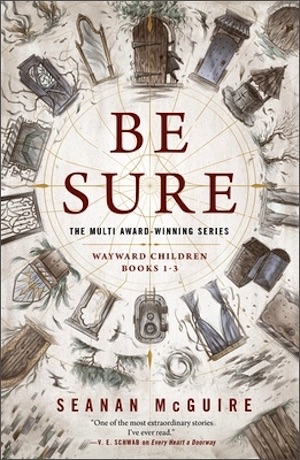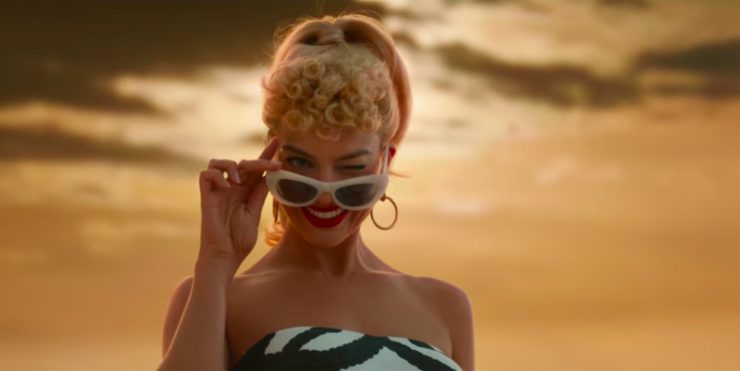Ours is an age of reboots and reimaginings, enough to make writers and audiences alike beg for new stories grounded in original material—but there is a reason why the classics of pop culture endure. They helped put us where we are today. They showed us the way. Case in point: the upcoming Barbie movie, which will hit theaters next week.
While the movie has been getting plenty of positive buzz in the lead-up to its release, I’ve also seen a fair amount of eyerolling on the internet over the mere idea of a Barbie movie. How do we possibly need a live-action Barbie movie in this advanced year of 2023? Mattel has always been hyper-protective of its flagship product—they wouldn’t even let Barbie in the first Toy Story film, fearing the movie would fail and tarnish her perfect image. But how could it? As Aqua taught us, life in plastic is fantastic.
Barbie is directed by Greta Gerwig, who helmed 2019’s Little Women and 2017’s Lady Bird to great acclaim, and was given full creative freedom in creating the film. During the 2020-21 COVID lockdowns, Gerwig wrote the film with her partner, filmmaker Noah Baumbach, drawing inspiration from such diverse and wide-ranging sources such as classic Technicolor movie musicals and Reviving Ophelia by Mary Pipher, a book that explores the social pressures that affect American adolescent girls. Such pressures—body image, mortality, sex, depression, cultural identity—all play out in Barbie Land. “I tend to start with things from my own life,” Gerwig said on the set of Lady Bird, “then pretty quickly they spin out into their own orbit.” One look at Barbie’s glorious Technicolor landscapes confirms that.
On June 12, The Kelly Clarkson Show featured four members of the Barbie cast, and host Kelly Clarkson wanted to know: Did they play with Barbies as kids? Margot Robbie (Barbie herself) did play with Barbies, and asked Gerwig to make the pink twisty slide that ran from Barbie’s dreamhouse bedroom to her pool because Robbie used to dream of having that feature in her own house. Issa Rae (President Barbie) said she played with Barbie in secret, because it wasn’t seen as a “cool” toy at the time, whereas Kate McKinnon (Weird Barbie) admitted to being “Barbie-curious” and checking out her sister’s collection.
America Ferrera, who plays Gloria, a Mattel employee in the film, cut to the heart of things, though. “I didn’t feel reflected in the world of Barbie—but now it’s totally different. It’s the Barbie we deserve. It’s so moving to get to be part of this reimagining of this world of beauty and fun and aspiration, where more of us get to be seen.”
Growing up as a middle-class White kid, I wasn’t aware of the deeper concerns surrounding Barbie at the time—was the entire Barbie concept racist, classist, gender exclusionary? Yes, almost certainly—but for the younger me, Barbie was simply a portal to playtime. I didn’t look at her body and wish it was mine, even if I did very much want her ballgowns and tried very hard to recreate them with bed sheets (sorry, Mom).
For six consecutive years, from the time I was eight until I was thirteen, Barbie arrived like an avenging superhero to save my life. Every summer, I found myself in peril. When school let out, instead of the freedom of summer vacation, I was doomed to a summer of exile from everything I loved, shipped off to endure the hottest months of the year in a southern state to stay with my father and his new family. I was stuffed into the spare room, where the couch folded out into a thin bed. I had to spend time with a sibling who didn’t understand why I arrived each year like a plague to sour his summer vacation. Why was his father suddenly someone else’s father? Summers were sticky with peanut butter-and-honey sandwiches and resentment. I didn’t like him, he didn’t like me, but we were kids and we were stuck.
Every summer my mom put me on the plane with two things: a bag of lemon drops, and enough money to buy a new Barbie doll when I reached my dreaded destination. I counted the minutes, which turned into days, until I could step into the air-conditioned environment of the local toy store. Getting a new Barbie was only a priority for me; everyone else had busy lives we had to interrupt in order to sneak in a run to the toy store.
I can still remember the waves of heat coming off the asphalt as we strode toward the toy store to collect a Barbie that would change my summer world. My brother was having none of it—he didn’t get money for a new toy, why did I have money for a new toy? I don’t know how his mother explained it. I was focused on my destination, the singular aisle within the store that radiated hot pink and called to me from a mile away.
Stepping into that aisle was like entering a portal to another world. There were so many Barbies, a person might lose their mind trying to pick just one. But that year, there was no question which Barbie was coming with me: Beauty Secrets Barbie. She had extra-long hair for hours of styling fun. It took every ounce of self-control to not open the packaging right there in the car. (I couldn’t lose her accessories.)
Buy the Book


Be Sure
Back at the house, I’d spend my afternoons styling that long Barbie hair and reading. I anticipated bringing Barbie home and introducing her to all my other dolls. They were great in groups—and I’d be able to show her off to my bestie, who had her own doll squad. Usually, we dreamed about Barbie working in this scenario or that: she was a doctor, she was a reporter, she was a fire fighter—but she was never named “Barbie.” We gave everyone their own name, making tiny nametags for each doll. Ken trying to borrow Donny’s spangled jumpsuit shall not be spoken of, nor the time we loaded everyone into the pink convertible and half the passengers fell out en route to the kitchen speedway. We didn’t have the Barbie Dreamhouse, but we longed for it. The dreamhouse became an estate, the estate became a kingdom. In school, the notes we would pass each other were often filled with more Barbie adventures; we were always plotting.
Looking back, Barbie and her closet of clothes were very much writing prompts. Dress Barbie this way, style her that way, what was her story? Where was she going? What was she doing? How did she become a horse jockey at her height and also run the entire country as its president? Barbie could do anything, it was known. Some of my first attempts at science fiction were likely undertaken with Barbie nearby, addressing critical questions like what would happen to Barbie’s hair in space. (The answer being, her hair became even more fabulous.)
In 2023, thanks to Gerwig and a genuinely exciting cast, Barbie’s story continues. Barbie—and by extension all those toys in all those aisles, even the G.I. Joes—allowed us to dream of better places, and if there was a Big Bad, plan out strategies to win the day. Barbie allowed us to problem-solve, world-build, and develop characters. The very idea of Barbie allowed me to escape my summer exile as a kid; she helped me stick out the weeks away from home and imagine different, better realities. She helped me become the writer I am today.
This summer, I’m getting lemon drops and enough money for a new Barbie—this time in the format of a live-action film. It will be a chance to celebrate a toy that played an important part in my childhood, but also an opportunity to have our expectations and assumptions turned upside down. To see something familiar, and often dismissed, turned into the possibility of creativity: new stories, new characters, new perspectives.
E. Catherine Tobler’s short fiction has appeared in Clarkesworld, F&SF, Beneath Ceaseless Skies, Apex Magazine, and others. Her novella, The Necessity of Stars, from Neon Hemlock, was a finalist for the Nebula, Utopia, and Sturgeon awards. She currently edits The Deadlands.










